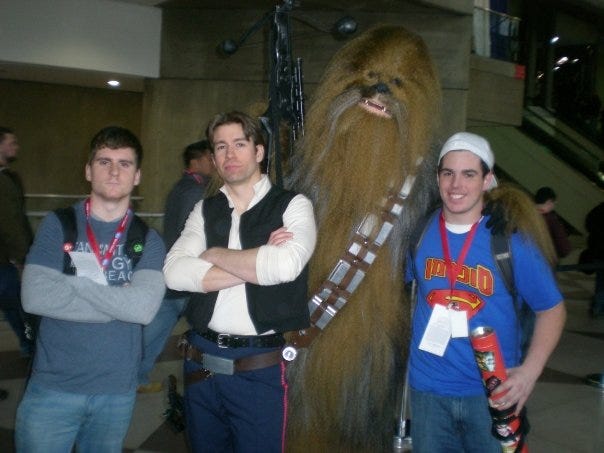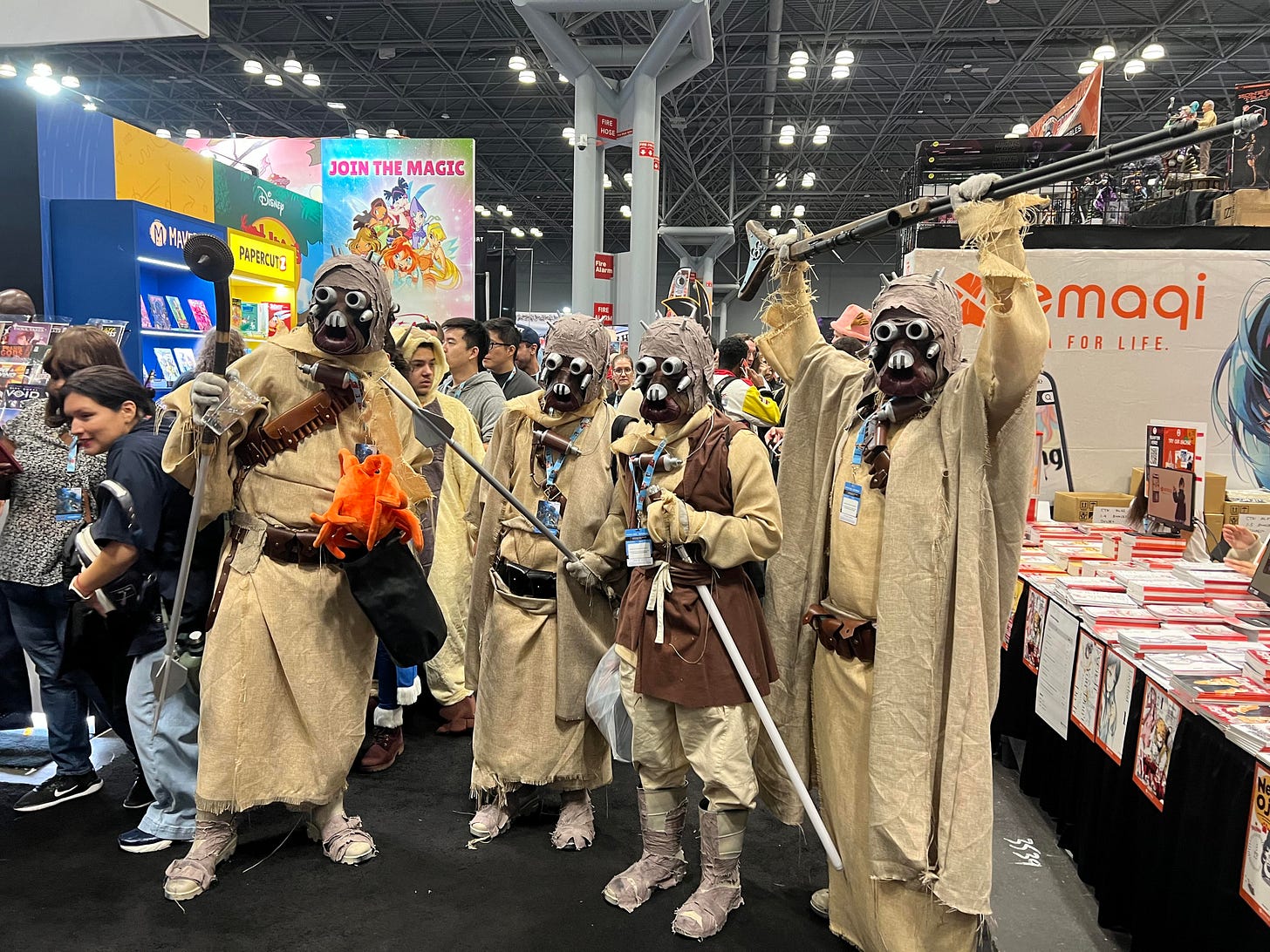A Time That Wasn't
reflections on nostalgia & time
"We tell ourselves stories in order to understand the world."
— Salman Rushdie, Haroun and the Sea of Stories
"Everything looks bad if you remember it."
— Homer Simpson, The Simpsons, Season 6, Episode 1 "Bart of Darkness"
If you asked me, I couldn’t tell you the last time I listened to Coldplay. Like many others, I was a fan of their first three albums and after that, especially when they started to really change their sound and push further into pop, I was out. I don’t think I’ve listened to anything they’ve come out with after that one song — you probably heard it in a Target or Old Navy ad — on Viva La Vida, at least not on purpose. This week I found myself shuffling onto something off of X&Y, their third studio album – and the last good one as far as some people are concerned.
The song is called Speed of Sound. And listening to it, much like Proust biting into his madeleine cake, I was transported back to my eighth grade “Moving Up” ceremony afterparty. I don’t remember the name of the Hall, or whatever place it was held — some ugly spot off of Jericho Turnpike that I believe was eventually torn down to build another Target, as New York State law mandates there be a Target for every 100,000 residents. I don’t always remember these kinds of details of my childhood, oftentimes things blur together into an indecipherable haze of memories where only the periodic moments of extreme humiliation or suffering stand out. I remember this because it was where I had one of my first kisses — the first kiss where a girl kissed me first, a critically important distinction.
Pictured: Modern Sistine Chapel in Huntington Station, NY
We’ll call her… Christina. Christina was a cute girl who I spent all of 8th grade playfully bullying. At the end of the dance, as we waited at the roundabout for our parents to pick us up, she poked at me as she had all year.
“You think I’m a wuss?” she asked me.
“Yeah.”
“We’ll I’m brave enough to do this,” she said as she grabbed me by my tie and planted an awkward wet kiss.
I was dumbfounded. She laughed and ran to away, jumping in a friend’s mom’s Toyota Sequoia. I felt like I had been hit in the head with an anvil.
What the hell just happened?
I got into my mom’s car and on my iPod mini listened to Speed of Sound as I looked out the window on our totally un-scenic middle of Long Island drive home.
Pictured: iPod Minis. They need to bring these back they are so fire
When I listen to Speed of Sound now, 20 years later, it feels different. Partially its now drenched in this air of inherent corniness, because Coldplay has been packaged and sold as feelings (for stupid people) for decades at this point. By digging around, it seems that their songs have appeared on more than 30 extremely popular television shows. Their hit song Fix You has been featured on soapy dramas like Greys Anatomy literally dozens of times. In some ways I think this is where some of the hate towards the band has come from – widespread popularity, simple lyrics, not too digging, and eventually they leaned into an even more vacuous pop style.
Even so, the song’s yearning for life to begin, its questions, mirrored how I felt as a 12-year-old kid at that eighth-grade dance, my whole life ahead of me. Back then, the lyrics were more of a declaration, a promise that life was just starting, full of possibilities.
But now? Now, the song feels like a reflection on lost time. If you never try, then you'll never know—it used to be motivational, a challenge. Now it feels more like a reminder of missed opportunities. Listening to it as an adult, I’m struck by how life hasn't lived up to the boundless wonder I thought it held. There's a sadness to looking back, realizing the wonder has faded, replaced by this weird longing that we call nostalgia.
Johannes Hofer is credited with coining the term nostalgia in 1688 as a medical condition, combining two Greek words: nostos, meaning “return home,” and álgos, meaning “pain.” Before Hofer's formalization of the term, there was not exactly a word to describe the psychological or emotional experience of longing for the past or home, though the feelings associated with it—such as homesickness—were obviously recognized in various cultures. The Germans had a term, “Heimweh,” meaning literally, "home pain,” used to describe the feeling. The phrase el mal de corazón ("the disease of the heart") was used in Spain during the 16th and 17th centuries to describe a condition of extreme homesickness or emotional distress, particularly among soldiers. Going back further, we might find similar concepts rooted in the historical exile of various groups from their ancestral homelands.
This history emphasizes pain.
I like that nostalgia includes pain in its name. That seems a more fitting and accurate assessment of the experience than what is often presented by people talking about their favorite childhood cartoons or old television shows that don’t exist anymore, but will soon be reappearing with the botoxed former cast on a Paramount Plus reboot in terrifying 4K. Our understanding feels like something learned, in part, from how nostalgia has been promoted and sold back to us.
Much like how vintage clothes or trends get rebranded for a new generation, our memories are now commodified. Speed of Sound, but really just a lot of art in general, no longer just represent my personal nostalgia; they’ve become a product themselves, tucked into the fabric of everyday shopping experiences, heard in Target ads and supermarket aisles. What used to evoke personal moments is now woven into the fiber of consumer culture, and that makes it cheap. Or maybe it would be more accurate to say it makes it soulless. It strips it of whatever made it something that resonated with you in the first place. It becomes a joke, the emotive blinking neon arrow on a shitty 20-episode season drama that lets you know it’s time to feel something. It’s time to cry. It’s time to run through the airport after the love of your life. And as suddenly as it elevated our life, it makes it something hollow, repetitive, fake, rehearsed.
This past weekend I felt the pangs of nostalgia again. Due to the weird nature of my life as a person-who-is-not-at-all-famous but a small group of freaks online pay attention to, I was invited by Paramount Plus to New York Comic Con.* I believe the last time I went to New York Comic Con was over a decade ago, in 2012. Before that, when I was in high school, I went for several years back-to-back. This was right around the time Comic Con first came to New York, so it was the very first years of the convention which gives me some degree of pride as a somewhat snobby nerd — to absolutely no one’s surprise, I was really into comic books in middle school and high school.
*Two Paramount Plus mentions here is crazy. This is not a sponsored post, but boy oh boy should you stream their new Star Trek animated show. Wow. Phew. What a world
Pictured: NYCC 2009. I was 17 in this photo if you can believe it. Look how snatched my jawline is omg I’m going to end it all
As I walked the packed convention hall which actually didn’t smell as bad as you’d think, but did smell alarmingly like spray can cheese, I was taken aback by how commercial it had become. There were always artists, writers, and Lou Ferrigno selling $40-a-pop polaroid photo-ops, but somehow since I last came it’s become even more like a mini-mall, walking from one curated commercial experience to the next. Do you want a $60 Rick & Morty mystery box? How about waiting on a 30-minute line to take a picture inside a shoddily reconstructed imagining of SpongeBob’s house? Oh, and for some reason Jon Voight is here. To be honest I would have done the SpongeBob house if I wasn’t so overwhelmed by the packed hall that I needed to leave within 45 minutes of getting there.
Walking around the main hall I couldn’t help but feel like I was at the epicenter of nostalgia’s commodification. I am surrounded by adults who still obsess over their childhood memories, many of whom will absolutely spin out if new writers and creators bring new angles to old stories or try to introduce new characters. Even the critically acclaimed and widely liked animated X-Men ‘97 seems, to some extent, to cash in on the longing for the animations, styles, and “grit” of cartoons from the 90s. Don’t worry, these products tell us. You’re a kid again. Everything is ok. The world is still full of possibilities. Life is not, actually, full of disappointment. Nostalgia - pain - no, that’s not what it means. What it means is now you get to pretend everything is right again.
Pictured: Nevermind, this went hard
As I walked away from the noise of Comic Con, I realized that nostalgia is more than just longing for a simpler time—it’s about reckoning with the fact that time has passed, and we can’t get it back. What we once held close has been repurposed, stripped of meaning, and sold back to us like cheap souvenirs. What once filled us with wonder now serves as background noise in a department store.
When I look in the mirror every morning, I can see myself decaying. A little more hair in my comb, a new crinkle in my eyes. And I so badly want to chase something behind me that I can never catch. I find myself becoming more sympathetic to older men who never grew up; it has nothing to do with me slowly becoming one of them. I am dying! Slow, sure, but still. The good news is my favorite cartoons are on.







small group of online freaks unite!
Oh this hurt a little more than I expected